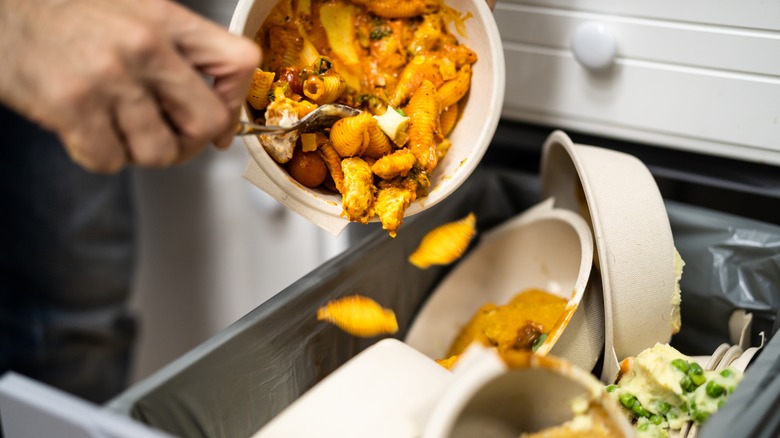Why You Should Stop Throwing Out Expired Food
While farms and the various businesses that bring food to the consumer have to work to become more sustainable, the struggle to reduce food waste begins at home. This is because, as FoodPrint writes, between 40 and 50% of all food waste occurs after it has reached the consumer. Two-thirds of the food waste is due to spoilage before it gets cooked. The remaining third gets wasted when we serve too much food and then scrap the leftovers.
While we no doubt could — and should — reduce waste overall, FoodPrint offers one surprising statistic that speaks to why we fail to use so much food: "An estimated 80% of Americans prematurely discard food due to confusion over the meaning of date labels." A similar issue was brought up by Vox. People throw away food because the label on the packaging says that we've passed the date for use. Originally, the labels were only meant for stores to know when they could stock which products. Customers, however, wanted to know what was on the labels, so it was made available to them. The problem is that since the dates are for selling, they indicate when the product is at its most appetizing. You can still eat most food after the sell-by, or best-by, date.
Trust your instincts about food labels
Because we use labels that are only meant to indicate when the food should be sold as a deadline for eating it, we end up throwing lots of it away. FoodPrint suggests that regulating how these labels are used in a consistent way could reduce waste by 20%. Moreover, you can take some comfort in knowing that the dates given on the labels are conservative estimates (per Consumerist). As long as you're storing the food properly, it will last a lot longer than the time frame suggested by the supermarket.
However, there is another method we could implement to reduce the amount of food we waste: the good ol' smell test. Go on. Give your milk a sniff. According to the author of "An Everlasting Meal: Cooking with Economy and Grace," Tamar Adler, many of us have lost confidence in our innate ability to pick out when food has gone bad. "In the absence of culinary information, people assume that any information they've been given must be the most important information," Adler said to Vox. "It's really hard to imagine you're supposed to trust your own nose and mouth." Yet you are. It's an easy way to reduce the amount of food you waste — which, in turn, reduces the amount of money you have to spend at the grocery store during this period of high inflation.

